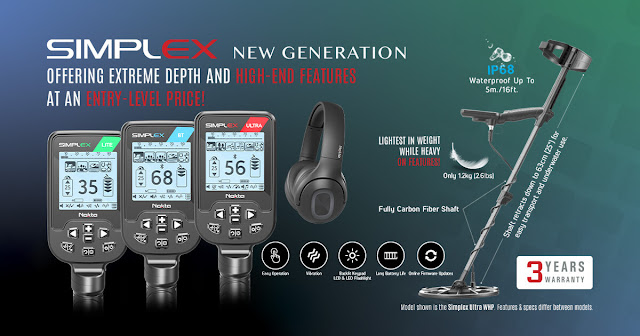Metal Detecting Tennis
Anyone keeping their eye on the main metal detecting manufacturers will know that the entry level end of the hobby is being saturated with new detectors. The pushing and pulling is coming from Minelab and Nokta, Nokta pretty much sealed the deal in the entry level market with the inception of the Simplex. Minelab clearly went after it with the introduction of their Xterra Pro, around the time of its release Nokta announced the introduction of a new line which included three new Simplex machines. A few months back Nokta then announced two new multi-frequency units called the Score and Double Score, these are both being sold at what I would call entry level prices. I believe Nokta are gunning for the Minelab Vanquish series with these specific detectors. Looking at the prices it makes me wonder just how much it actually costs to manufacture these new wave of machines, I'm thinking very little.
Let's give credit where it's due, all the machines mentioned above for the price are fantastic, they're literally lightyears ahead of all the beginner machines that were available when I first started detecting. Things have moved forward a lot but I personally think we hit a wall a while back. It actually looks like Minelab have regressed in what they're offering with the release of the Xterra Voyager. It looks like some cheap Chinese machine that they've literally just stuck their name on. I'm starting to question what Minelab are all about these days, there seems to be something odd going on in regards to the quality of what they're now producing, and the thought process behind their releases seems confused. If they continue to put out cheap mediocre detectors I can see them running into troubles. Let us not forget what happened to Easter Island, OK so Minelab probably won't turn to cannibalism, but large organisations can have a very fragile core.
When I look at all these machines I can't help but wonder if we're literally being presented with pretty much the same metal detector over and over again. Cosmetically they might look different and have a different company name on them but is there really a big enough difference between them all when it comes to raw performance. If I'm going to be honest I genuinely don't think there is. Depth limits have pretty much been reached on a digital platform and the unmasking and separation literally has nothing in it. From all the demos I've watched each detector seems to perform at similar levels in this regard.
From a business perspective there has to be give and take, what I mean by this is, Nokta can't release a new cheaper multi-frequency machine that's going to equal the Legend otherwise they're shooting themselves in the foot. Clearly they have to stunt their performance in certain areas otherwise people are going to start to wonder what they're actually getting that's better in the machines at a higher price point. To help brush over this issue, releasing units with fewer settings works well because limited performance can be justified by limited settings. I also understand that the machines with no settings allow people to easily get into the hobby and if they enjoy it then they can move on to a detector that's a little more versatile.







I agree we are basically getting the same detector over and over. Just like the smart phone market, digital detectors are limited by the processing power of their CPUs, and by the batteries used to power them.
ReplyDeleteThe Deus II has more signal processing than its competitors, so if you spend a year or so learning how to tweek it for every different site, you can eke out another half inch depth or separate signals by another half inch. The problem is the human ear has had hundreds of millions of years of evolutionary refinement, and is so much better than computers at interpreting the raw boops, blips, pauses, and groans coming out of an analog detector.